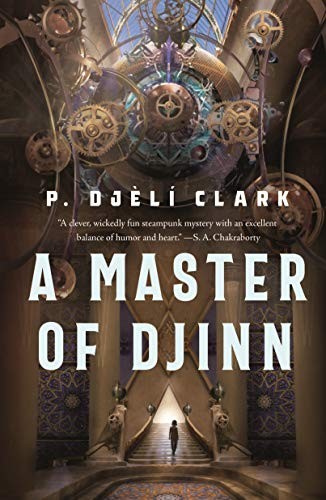Antolius wants to read Begin Transmission by Tilly Bridges

Begin Transmission by Tilly Bridges
Trans woman and screenwriter Tilly Bridges takes you through the trans allegories of the Matrix franchise, with deep dives into …
I mostly read sci-fi and fantasy in all shapes and sizes; paper, e-books and audiobooks.
This link opens in a pop-up window
28% complete! Antolius has read 7 of 25 books.

Trans woman and screenwriter Tilly Bridges takes you through the trans allegories of the Matrix franchise, with deep dives into …

In Manhattan, a young grad student gets off the train and realizes he doesn't remember who he is, where he's …

Nebula, Locus, and Alex Award-winner P. Djèlí Clark returns to his popular alternate Cairo universe for his fantasy novel debut, …

Nebula, Locus, and Alex Award-winner P. Djèlí Clark returns to his popular alternate Cairo universe for his fantasy novel debut, …

A girl visits a bazaar in Cairo, seeking a favor from a mysterious angelic being.
This story first appeared …

Traduttore, traditore: An act of translation is always an act of betrayal.
1828. Robin Swift, orphaned by cholera in …

Egypt, 1912. In Cairo, the Ministry of Alchemy, Enchantments and Supernatural Entities investigate disturbances between the mortal and the (possibly) …
This novella picks up directly where A Psalm for the Wind-Built ends, but continues in a more spaced out pace. We follow Dex and Mosscap through a series of vignettes as they tour the human side of Panga, which gives Becky Chambers the opportunity to showcase more of her exquisite world building. While in the first book we learned about the history and glimpsed at a slice of human life, in this one we meet more varied communities, each with their unique spin on the prevailing hope punk aesthetic.
Unlike the first story, which relied heavily on interactions between just Dex and Mosscap, here we see them engage with different characters on their journey. In a way this dilutes the narrative; the numerous side characters are not as deeply developed, the exchanges with them not so philosophically intricate. At first I resented this difference in treatment, but by the …
This novella picks up directly where A Psalm for the Wind-Built ends, but continues in a more spaced out pace. We follow Dex and Mosscap through a series of vignettes as they tour the human side of Panga, which gives Becky Chambers the opportunity to showcase more of her exquisite world building. While in the first book we learned about the history and glimpsed at a slice of human life, in this one we meet more varied communities, each with their unique spin on the prevailing hope punk aesthetic.
Unlike the first story, which relied heavily on interactions between just Dex and Mosscap, here we see them engage with different characters on their journey. In a way this dilutes the narrative; the numerous side characters are not as deeply developed, the exchanges with them not so philosophically intricate. At first I resented this difference in treatment, but by the end of it I grew to appreciate the ways in which these interactions serve as opportunities to showcase the deepening relationship between Dex and Mosscap.
If in the first book the monk and the robot were getting to know each other, here they develop a true friendship. The structure of the two stories lines up, and this one too culminates with a conversation between the two of them hearkening back to the end of the first story. And again, they reach no answers, just some insights. There's wisdom here again, and truthiness, and a touch more feel good vibes.

The boy was raised as one of the Chained, condemned to toil in the bowels of a mining ship out …

Traduttore, traditore: An act of translation is always an act of betrayal.
1828. Robin Swift, orphaned by cholera in …
Thoroughly delightful respite from gloomy books I've been reading lately.
I've enjoyed Becky Chambers' work for years, and I feel she distilled it to perfection in this novella. Length-wise it is just enough to paint a picture of a beautiful solarpunk world, and to give us characterization of Dex, the main protagonist. There is nothing superfluous to it, and there is no rush either; the pace is contemplative and purposeful.
I loved the world building; the slow paced, hopeful world of Panga feels like a perfect place for me. On the other hand, it is a clever backdrop for Dex's angst and struggle to find their own purpose in life. Chambers pulls off a great feat with portrayal of Dex; they feel rich, complex and fully realized human being. Clever too is the contrast of the titular robot to Dex's monk, and the cute, often philosophical exchanges between …
Thoroughly delightful respite from gloomy books I've been reading lately.
I've enjoyed Becky Chambers' work for years, and I feel she distilled it to perfection in this novella. Length-wise it is just enough to paint a picture of a beautiful solarpunk world, and to give us characterization of Dex, the main protagonist. There is nothing superfluous to it, and there is no rush either; the pace is contemplative and purposeful.
I loved the world building; the slow paced, hopeful world of Panga feels like a perfect place for me. On the other hand, it is a clever backdrop for Dex's angst and struggle to find their own purpose in life. Chambers pulls off a great feat with portrayal of Dex; they feel rich, complex and fully realized human being. Clever too is the contrast of the titular robot to Dex's monk, and the cute, often philosophical exchanges between them.
I also liked the book's ending. It might leave things seemingly unresolved, but the story climax presents convincing argument for the value of self discovery over finding the (unattainable) solutions. In its philosophy, its character and world building, and its beauty, this story felt true to me, and that's my favorite thing.

It's been centuries since the robots of Panga gained self-awareness and laid down their tools; centuries since they wandered, en …
Content warning Mild spoilers about some topics covered by the book
@ijc I liked the ending of Termination Shock. The plot lines / point of view characters converged in a natural and satisfying way. It was appropriately bombastic (in line with the rest of the novel). And things got wrapped up as much as can be expected with a book of this size. For me getting through the middle section was more tedious. I lost few months there, having put the book down for a while after my initial interest waned.

Good Omens meets The Long Way to a Small, Angry Planet in this defiantly joyful adventure set in California's San …

It's been centuries since the robots of Panga gained self-awareness and laid down their tools; centuries since they wandered, en …